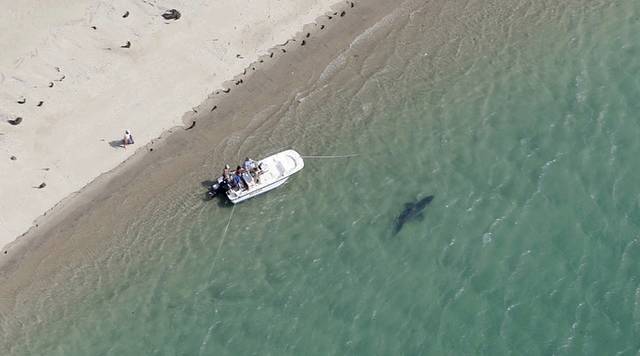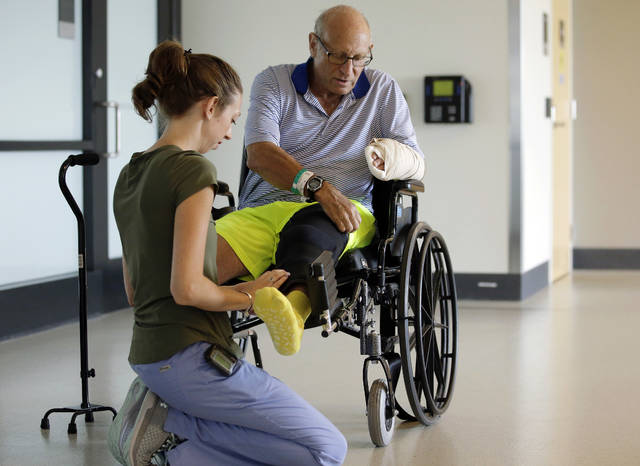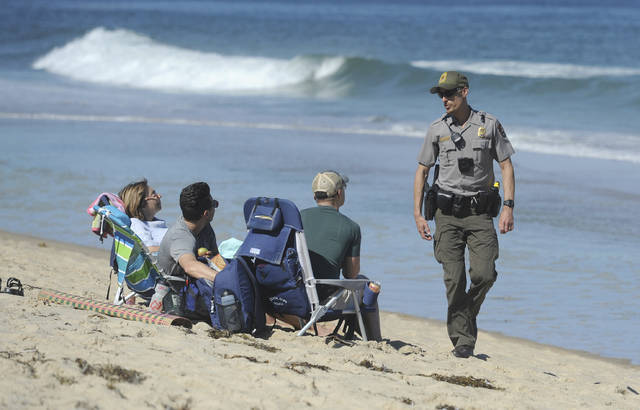BOSTON — Unease is growing among surfers, fishermen and residents of touristy Cape Cod that officials are responding far too slowly after last summer’s shark attacks, which included the nation’s lone human fatality of 2018.
A long-awaited study looking at seal culling, shark barriers and other strategies is expected to launch soon, but the exhaustive analysis won’t be completed before the summer season, as hoped. Local officials say they’re instead focused on stepping up their emergency response and improving beach communications ahead of this season.
Wellfleet property owner Heather Doyle is among those who feel the wait is unnecessary. She and others have been pushing for the town to pilot new technology like shark-detecting sonar buoys this year.
“We can find some low-hanging fruit, some small wins that make the waters safer now,” Doyle said. “They may not be 100 percent effective, but I know for sure what is not 100 percent effective. And that’s doing nothing.”
A 26-year-old Revere man became Massachusetts’ first shark fatality in more than 80 years after he was killed while bodyboarding in Wellfleet in September. That attack came weeks after a New York man survived after being badly bitten off a beach in neighboring Truro.
But it shouldn’t have taken those two attacks for officials to investigate ways to mitigate shark attacks, said Wellfleet resident Margaret Flanagan.
Officials in recent years have largely focused on public education campaigns like posting shark warnings at beaches and hosting training sessions for residents on how to make a proper tourniquet in the event of an attack.
“Fishermen have been very vocal for a long time about the growing population and how the sharks would adapt and start coming into the shallows to hunt,” Flanagan said. “It was only a matter of time.”
The study isn’t expected to be complete until September, but some communities have already committed tens of thousands of dollars to new measures this season.
The federally managed Cape Cod National Seashore and the town of Orleans are placing trauma kits packed with tourniquets and other lifesaving medical equipment at remote beaches and investing in additional medical training for lifeguards and beach staff.
The town of Wellfleet is extending lifeguard shifts past the traditional closing of the beach season on Labor Day. Wellfleet and Orleans are also installing emergency 911 call boxes at their beaches.
“I can completely understand those who think these efforts are moving too slowly,” Wellfleet Town Manager Dan Hoort said. “But when it’s public safety and a proposal to spend millions of dollars, the town needs to make sure it’s done right.”
The study and this year’s measures are steps in the right direction, but officials still need to bring surfers and other recreational oceangoers into the decision-making process, said Chris Zocca, a 70-year-old Harwich resident.
Town officials have held public forums to hear from shark researchers and other experts, but Zocca and other local surfers and body boarders have also been hosting their own gatherings to hear about technology currently on the market. A recent gathering featured an executive from a company that makes shark-detecting sonar buoys.
“We’re the people in the water all the time. We’re going to be very affected by any decision that’s made,” Zocca said. “We need to be involved.”
Chatham fisherman Nick Muto said he’s concerned officials won’t ultimately address the massive population of seals drawing great whites in the first place. Both seals and great white sharks have rebounded in recent years, thanks largely to federal protections.
“If you’re only dealing with the sharks, you’re throwing good money at bad,” he said. “But if you reduce the food source, those things are going to leave.”
Culling or administering contraceptives to seals are among the measures being reviewed by the Woods Hole Group, a local environmental consulting firm that has been commissioned for the study, which officials have said will cost around $50,000.
The firm is also expected to assess how effective using aerial drones, spotter planes and other technology is in monitoring and tracking sharks. It will look at repellents and other protections for surfers and swimmers. And they’ll weigh different barriers to prevent sharks from encroaching on popular swimming beaches, from rigid plastic enclosures to more permeable nets and even ones that mimic kelp forests.
“Mitigating shark and human interactions is something officials and entrepreneurs have been trying to do for a long time,” said Matt Cadwallader, the firm’s business development director. “There is a massive body of research on this.”
———
Follow Philip Marcelo at twitter.com/philmarcelo.




